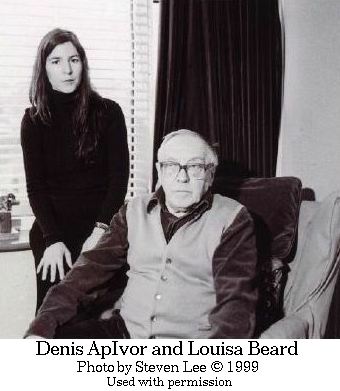|
A LONG AND DIFFICULT ROAD
Denis ApIvor's music remains little-known
and unrecorded. GORDON RUMSON pleads his case.
Denis ApIvor was born in 1916 in Eire. Though of Welsh background he
has spent most of his creative life in England. For many years he was much
influenced by the Viennese serial composers including Webern, and while
many of his works have a Spanish colouring, the sound and ideals of the
18th century with their clarity and wit have also left their mark. Intellectually
he has been profoundly affected both by T.S. Eliot and Buddhism.
From this audacious combination, categorising him instantly as one of
Nietzsche's 'Good Europeans', Denis ApIvor has synthesised a meaningful
whole with a firm creative hand. The reason for this is simple: Denis ApIvor
has the rare gift of melodic creation that gives strength and form to his
music. With this innate gift, nurtured by contact with the music of Warlock
and van Dieren and developed by careful study, ApIvor has unified the seemingly
disparate elements of his life. Neither the varied techniques of composition
he has used, nor even the three distinct style periods of his life can disguise
his essential nature. His voice can be heard throughout.
But for now his voice can only be heard by those who have access to the
musical scores or chance to be nearby an isolated performance. It is a tragedy
that a composer of such eminent worth is completely unrepresented by performances
on CD or even LP (the exception being a single guitar work recorded in the
1980s). Of the 4 operas, 5 symphonies, ballets, concertos, numerous piano
works, songs and many chamber pieces for a total of 100 opus numbers, not
a note is available and this in spite of performances by eminent musicians
such as Sir E. Goossens, Christopher van Kampen, Martin Jones, Julian Bream,
del Mar, the Amici String Quartet, Eiluned Davies, the Allegri Quartet and
Thea King among others.

Fortunately performances continue: for example, soprano Louisa Beard
will perform Dr ApIvor's songs after Federico García Lorca op. 8
and op. 100 at the British Music Information Centre (10 Stratford Place,
London W1N 9AE Tel. 0171 499 85 67 Tickets £5 at the door) on Wednesday
July 28, 1999 in a concert sponsored by the Oficina Cultural of The
Spanish Embassy with the collaboration of the Instituto Cervantes.
Denis ApIvor began music studies early and was composing by his tenth
year. He was a member of the choir at Christ Church Oxford and later at
Hereford Cathedral. There he studied the clarinet, piano, organ and played
in the local orchestra.
His compositional life can be divided into three periods. From 1936 to
the early 1960s, from the 1960s until the mid 1980s and from that time leading
up to the present. The first period is melodious and tonal with much chromaticism
developing towards Schoenbergian serialism; one easily hears the music of
van Dieren and Warlock lurking in the background. The second is the abstract
serialist phase and is characterised by music of intense intellectual control,
non-thematic process and yet also the use of indeterminacy. The third phase
is characterised by a refined simplicity.
Because his family was opposed to music Denis ApIvor pursued and completed
medical studies. However, he continued simultaneous studies in music through
his contact with Cecil Gray and Alan Rawsthorne. He also became closely
acquainted with Constant Lambert. This last contact was to be of crucial
significance, for after War service in India as a doctor, Denis ApIvor returned
to England, with further study and composition until 1950 when Constant
Lambert performed Dr ApIvor's setting of T.S. Eliot's The Hollow Men
(op. 5 1939 revised 1949). The performance's success brought Denis ApIvor
into considerable prominence. This composition for men's chorus and orchestra,
which had been completed before hostilities began, is one of Dr ApIvor's
most important. It captures the mocking and enervated essence of the text
with music that is precise, ironic and powerful. Again through Lambert's
good words, Denis ApIvor received numerous commissions from the Royal Ballet.
Perhaps his greatest success came with Blood Wedding, which was widely
performed (Germany, Vienna, Copenhagen, New York, Cape Town, Ankara and
Santiago).
Continue >>
Copyright © Gordon Rumson,
July 25th 1999
<< Music &
Vision homepage Pen to paper >>
|